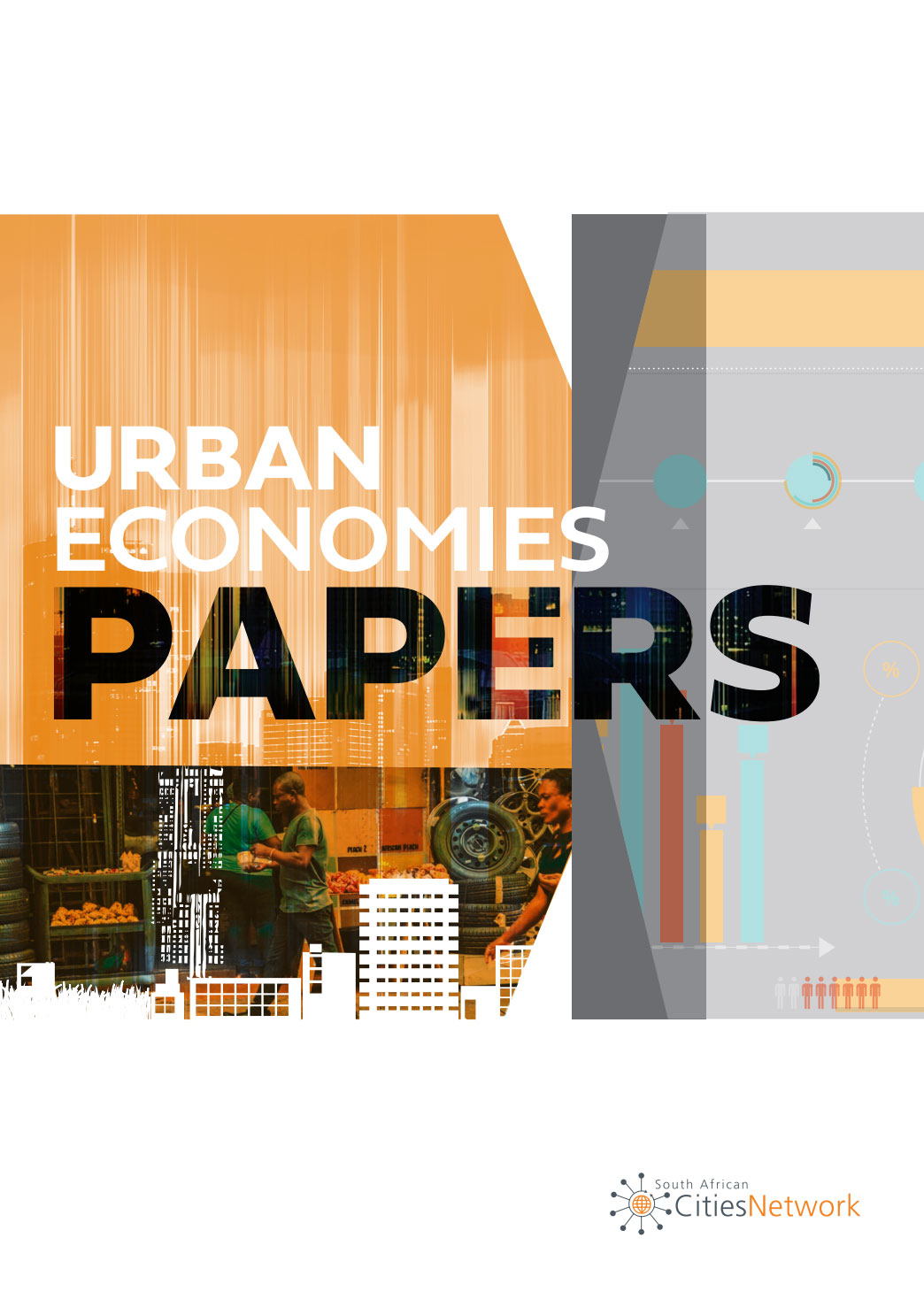Urban Economies Papers

The narrative of cities as engines of growth and development is well acknowledged in South Africa. The Integrated Urban Development Framework (IUDF) articulates the notion of an urban dividend, which can be reaped through aligning and coordinating investments, developmental plans, and outcomes around people, place and the economy. The IUDF proposes nine policy levers, including Inclusive Economic Development (Lever 6), which is essential for creating jobs, generating higher incomes and creating viable communities. However, the substance of the urban dividend has eluded the majority of South African cities.
Despite being responsible for most of the country’s economic activity and employment, South African cities are not as competitive, productive or inclusive as they should be. Cities may be attuned to the importance of their economies, but have not established clarity and governance of their specific economic roles and functions. Local government suffers from a historic tension between the understanding of local economic development (LED). On the one hand, LED is seen as facilitating business promotion, job creation, small business support, skills development, micro-economic development projects and tourism, but on the other hand, larger, metropolitan municipalities are seen as strategic economic development actors, actively levering their role as planning authorities, land owners, infrastructure investors, and strategic decision-makers to steer and support their economies.
These working papers on “Strengthening Urban Economies” explore how to grow urban economies through improving local conditions for diverse enterprise development and growth, ensuring inclusive economic infrastructure and services, and building innovation-driven economies.
Since 1994, the structure of South Africa's economy has changed, as a consequence of economic reforms and trade liberalisation. However, the country remains stuck in a "middle-income trap", with stagnant economic growth and an economy that remains dependent on mineral-resource exports. The necessary economic growth and development has failed to materialise. In their paper “The Economic Landscape of South African Cities: Diversity across space, sector and skills”, Justin Visagie and Ivan Turok identify a large gap in the current debate about growing South Africa’s economy: the spatial differences in economic resources and capabilities. The paper asks questions about the different growth paths and the changing industrial and occupational mix of South African metros, and seeks to understand the factors that influence their economic development. The paper concludes that more attention needs to be given to the distinctive features of South African cities (and regions), which has practical implications for policy-makers. Industrial policy and business-support programmes need to be flexible and responsive to the local context, while the demand and supply of skills has to be tailored for each context. Most importantly, more long-term research into the performance of South African cities should be prioritised and include a regular census of firms.
To understand the space economy in South Africa requires engaging more meaningfully with the informal economy. Three papers examine various aspects of the informal economy in cities. In their paper, Tanya Zack and Kirsten Harrison look at “The Role of Informal Economies in Transforming the Space Economy” and examine the link between formal and informal economies. Case studies from Johannesburg (Ivory Park and Jeppe Street) are used to illustrate the transformative impact of the informal economy on the urban space. The paper demonstrates the scale and power of the informal economy to shape South Africa’s urban space and argues for recognising and bringing informal economies into the broader space economy. It suggests ways of achieving this, starting with re-thinking terminology, to allow greater nuance when describing informal enterprises, and recognising the scale of the informal economy and the intertwining of the formal and informal sectors. The paper argues that cities need to adopt an enabling approach that goes beyond tolerating informality to actively incorporating micro businesses into economic and spatial planning and other institutional systems.
Pundy Pillay and Megan Govender uses a governance lens to explore ways in which cities can integrate the informal sector into the mainstream economy. Their paper, “Integrating the Informal Sector into the Local Economy”, finds that cities often see the informal sector as a problem, not as an essential part of the economy. At the same time, the informal sector finds itself having to operate outside the regulatory frameworks because of obstacles that result from city policies and from city actions, e.g. harassment by local law enforcement. The paper recommends that cities look at establishing participatory platforms for informal traders, strengthening inter-departmental collaboration, and ensuring that their policies are cognisant of the diversity in the informal sector, with clear guidelines on the power of city officials. Above all, cities need to accept that the informal sector cannot be wished away but is an essential part of the economy.
One way in which cities can assist the informal sector is to provide infrastructure and services. This is what Mamokete Matjomane and Olga Koma argue in their paper “Infrastructure and Services are Central to Growing the Informal Sector”. The provision and access to infrastructure are recognised as crucial for economic development, but little attention has been paid to its impact on the informal economy. The paper looks at the access, adequacy and affordability of infrastructure provided to the informal sector in selected sites in South Africa and Ghana. It highlights efforts by the private and public sectors to provide infrastructure and services to informal traders, as well as bottom-up initiatives that have had greater success. The paper suggests that cities need to adopt an inclusive approach to informal trading areas and should learn from the local, bottom-up initiatives. It argues that informal traders (through area-based committees) should lead the process of developing infrastructure to support their needs, with the private and public sectors playing a supporting role. By providing infrastructure that meets the traders’ needs, cities would not only make more efficient use of their resources but also promote the growth and development of informal enterprises.
The efficient use of resources is a crucial aspect of a sustainable city, but are South African cities incorporating sustainability and green economy concepts into their planning process? This is the question that the paper by Shakespear Mudombi and Sandra Mukumbirofa, “An Institutional Perspective on Sustainability in South African Cities”, seeks to answer. They also look at household perceptions and challenges, as these influence societywide transformation towards sustainability. The paper finds that, while cities do incorporate sustainability into their plans, they have not gone far enough. Sustainability needs to be embedded as a cross-cutting theme within institutional processes and practices, which will require having a vision and storyline, as well as clear rules of the game that all stakeholders understand. In addition, local and national government must work towards eradicating the silo mentality and addressing institutional challenges. More broadly, there is a need for awareness and behaviour change programmes and comprehensive data collection.
The digital economy, as a way to accelerate the township economy, is the theme of the paper "Mobile-ising for an Inclusive Economy" by Shahid Solomon and Lucky Kgwadi. The paper proposes that South Africa can grow its economy through converging the township economy with the modern urban economy. Case studies are used to illustrate the potential of the township digital economy, which is made possible by greater access to smartphones and digital platforms, as well as mobile technology and enhanced connectivity. The fourth industrial revolution provides an opportunity for townships entrepreneurs to leapfrog their businesses, provided that they receive appropriate support. The paper highlights the need to tackle high data costs, develop partnerships and mobile learning platforms, and to train entrepreneurs. Most importantly, start-up cultures in townships need to be fostered, locally owned IT and digital companies supported, and user-friendly apps and platforms developed.
The paper by Methembe Mdlalose, “Coastal Regional Development in South Africa through Special Economic Zones” examines special economic zones (SEZs), as a means for coastal secondary cities and towns to benefit from the economic growth in coastal metropolitan cities, which are among the largest contributors of gross domestic product (GDP). It examines SEZ development in China and Malaysia compared to South Africa and draws some lessons on how South Africa could maintain its competitive advantage and exploit diversified industrial development along the coast. The objective of these papers is to inform and encourage city stakeholders to engage critically and practically on strengthening urban economies. The papers are about understanding and enabling how cities can promote inclusive economic development, strengthen their economic governance, expand economic participation and grow urban economies.



Comments